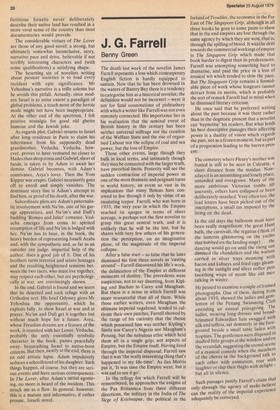J. G. Farrell
Benny Green
The death last week of the novelist James Farrell represents a loss which contemporary English fiction is hardly equipped to sustain. Now that he has been drowned in the waters of Bantry Bay there is a tendency to categorise him as a historical novelist; the definition would not be incorrect — were it not for fatal connotations of pishtushery with which a writer like Farrell was not even remotely connected. His importance lies in his realisation that the seminal event of British history in this century has been neither universal suffrage nor the creation of the Welfare State and the rise of organised Labour nor the eclipse of coal and sea power, but the loss of Empire.
Those other events, large though they bulk in local terms, and intimately though they may be connected with the larger truth, have parochial limits. Posterity will see the sudden contraction of imperial power as one of the most dramatic and poignant turns in world history, an event so vast in its implications that many Britons have contrived to live through it only by virtue of an insulating torpor. Farrell, who was born in 1933, the very year in which the Empire reached its apogee in terms of sheer acreage, is perhaps not the first novelist to grasp this great central truth, and it is unlikely that he will be the last, but he shares with very few others of his generation the perception, on an imaginative plane, of the magnitude of the imperial collapse.
After a false start — so false that he later dismissed his first three novels as 'casting around' — Farrell discovered his life's work, the delineation of the Empire at different moments of destiny. The precedents were auspicious, not to say daunting, from Kipling and Buchan to Carey and Maugham. But there is a sense in which Farrell was more resourceful than all of them. While those earlier writers, even Maugham the ultimate imperial vagabond, tended to cultivate their own patches, Farrell showed by the range of his curiosity that the theme which possessed him was neither Kipling's Simla nor Carey's Nigeria nor Maugham's Penang, but the nebulous ethic which held them all in a single grip; not aspects of Empire, but the Empire itself. Having lived through the imperial dispersal, Farrell saw that it was 'the really interesting thing that's happened in my life-time'. As Jan Morris put it, 'It was time the Empire went, but it was sad to see it go'.
In the trilogy for which Farrell will be remembered, he approaches the enigma of the Pax Britannica from three different directions, the military in the India of The Siege of Krishnapur, the political in the Ireland of Troubles, the economic in the Far East of The Singapore Grip, although in all three books he goes to some pains to show that in the end empires are lost through the same agency by which they are won, that is, through the spilling of blood. It was the drift towards the commercial workings of empire in The Singapore Grip which made that book harder to digest than its predecessors. Farrell was attempting something hard to dramatise, and paid the price in a loss of ironical wit which tended to slow the pace. But The Singapore Grip remains a formidable piece of work whose longeurs cannot detract from its merits, which is probably the sort of remark Farrell had in mind when he dismissed literary criticism.
He once said that he preferred writing about the past because it was there rather than in the dogmatic present that a novelist can 'hypnotise' his readers. But what lends his best descriptive passages their affecting power is a duality of vision which regards, the past, not as a frozen moment, but as part of a progression leading to the barren present: The cemetery where Fleury's mother was buried is still to be seen in Calcutta, a short distance from the maidan. Nowadays it is an astonishing and lonely place, untended and overgrown. Many of the more ambitious Victorian tombs tilt unevenly, others have collapsed or been deliberately smashed. Very often too, the lead letters have been picked out of the inscriptions, a small tax imposed by the living on the dead.
In the old days the ballroom must have been really magnificent: the great Hunt balls, the carnivals, the regattas (think of the lanterns glimmering on the yachts that bobbed on the landing stage) the dancing would go on until the rising sun dimmed the chandeliers and the waiters carried in silver trays steaming with bacon and kidneys and fried eggs gleaming in the sunlight and silver coffee pots breathing wisps of steam like old men talking in winter.
He paused to examine a couple of framed photographs. One of them, dating from about 1910, showed the ladies and gentlemen of the Penang Swimming Club attending an annual prizegiving. The ladies, wearing long dresses and broadbrimmed Edwardian hats swagged with silk and taffeta, sat demurely in the foreground beside a small table laden with trophies. The gentlemen were disposed in studied little groups at the window and on the verandah, suggesting the crowd-scene of a musical comedy when the members of the chorus in the background talk to each other with animation, roar with laughter or slap their thighs with delight but all in silence.
Such passages justify Farrell's claim that only through the agency of make-beheve can the reality of the imperial experience adequately be conveyed.






























 Previous page
Previous page